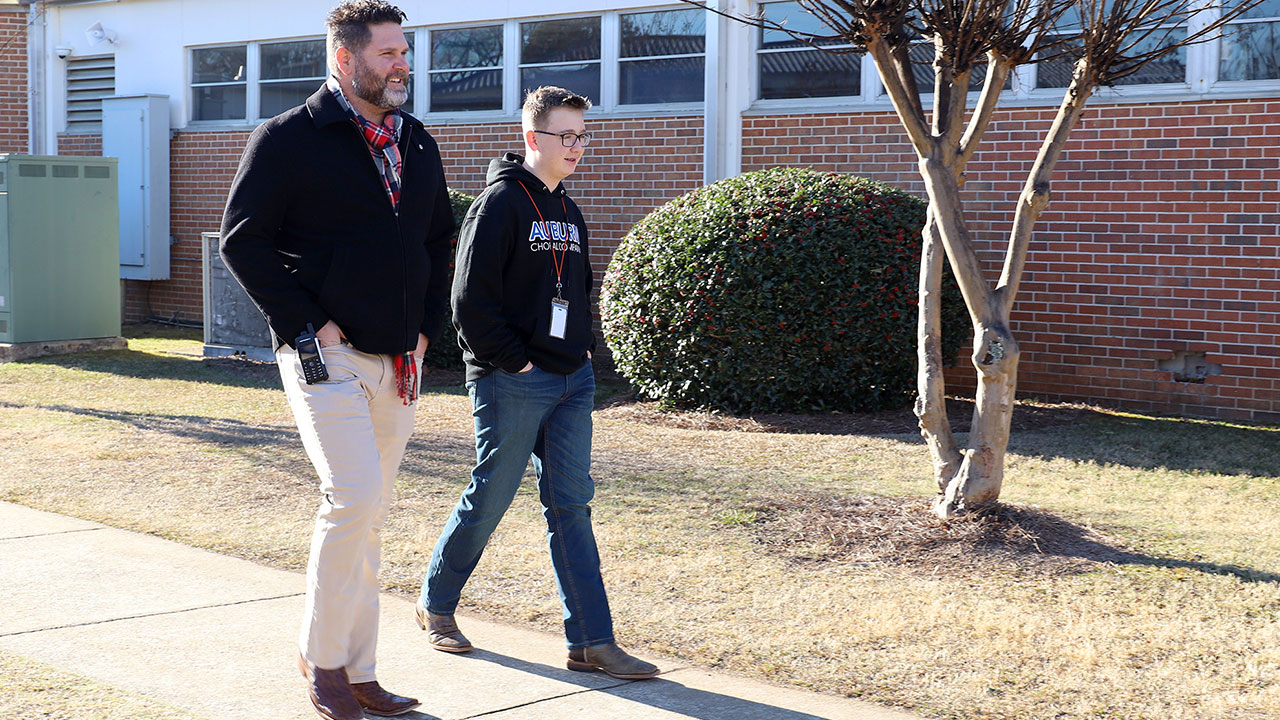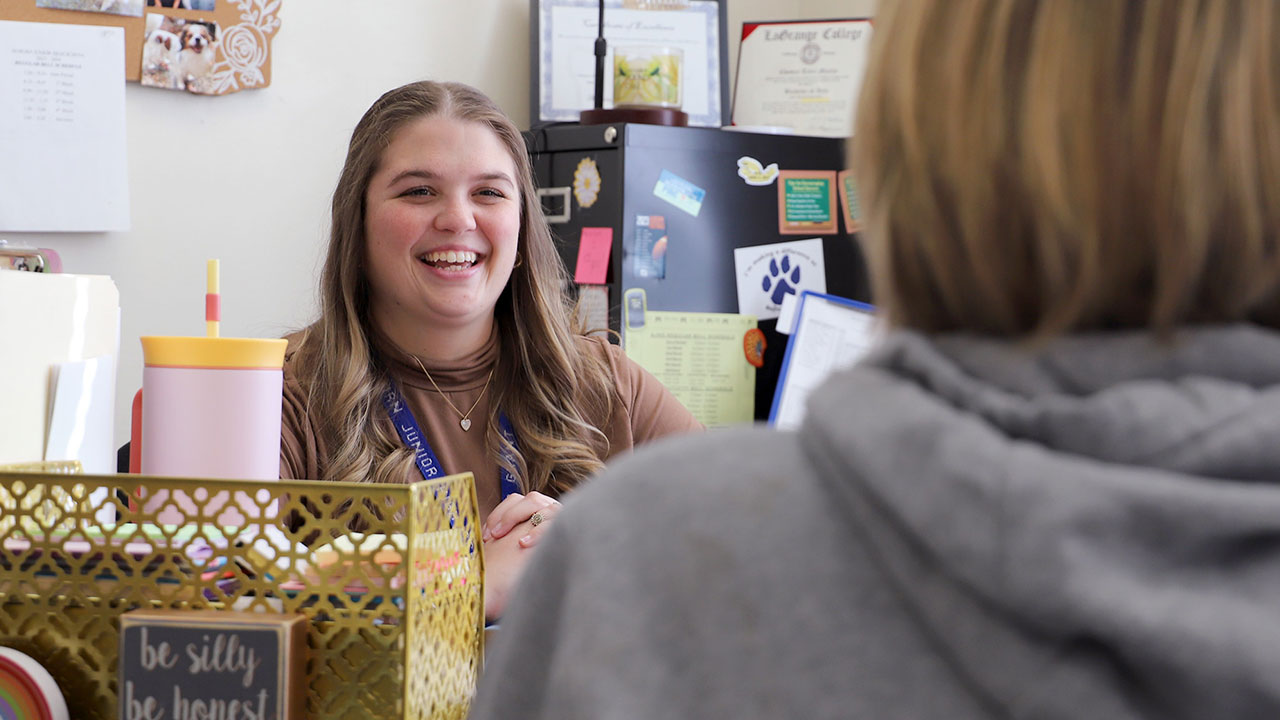content body

Donnie Payne, a 2015 graduate of Auburn University's College of Education, works as a school counselor at Auburn Junior High School. He is pictured walking with a student at the school.
National School Counseling Week is a time to honor the work and contributions of school counselors and is recognized during the first full week in February.
Among those dedicated to the cause is Donnie Payne, who says he’s living out his calling thanks to all he learned through the School Counseling Program of Auburn University’s College of Education.
“When I decided to become a school counselor, I knew I wanted to work with kids because they brought me joy. Auburn showed me that working with kids was a calling,” said Payne, a 2015 graduate who now works as a school counselor at Auburn Junior High School. “I remember sharing case studies with my cohort in my internship class and celebrating the successes and being brought to tears by some of the trauma that our students faced. It was eye-opening.”
These days, Payne said his greatest achievements are based on the success of others.
“My most exciting accomplishments come every time I see a former student being successful, especially those who struggled when they were with me,” he said. “That’s why I do what I do.”
A growing demand
Payne is among many successful professionals who have benefited greatly from the school counseling program at Auburn’s College of Education. Amid National School Counseling Week, which runs from Feb. 3-7, officials say many more are needed for the school counseling field as the demand for such roles continues to grow in addressing student needs in ever-turbulent times.
“As more schools recognize the importance of mental health and of 21st century employability skills, the demand for qualified, well-trained school counselors is only expected to grow,” said John McCall, an assistant professor for Auburn’s School Counseling Program.
According to the American School Counselor Association (ASCA), the recommended ratio is one counselor for every 250 students, but McCall said many states, including Alabama, still struggle to meet that recommendation. In fact, nationwide, the average ratio is closer to one counselor for every 500 students, making it difficult for school counselors to provide the level of individualized support students need. McCall added that the gap is especially prominent in rural and high-need areas, where counselors often have larger caseloads and face more significant challenges in terms of resources and support.
Associate Professor and School Counseling Program Coordinator Malti Tuttle said her program prepares students well for the role, and her students are highly sought after in the job market, with students being employed across the country. She said the job they undertake is vital.
“School counselors are truly the heart of every school,” she said. “They build meaningful connections with students, families, teachers, staff and the community. With deep care and dedication, school counselors ensure that students are supported and well-prepared to succeed throughout their K–12 journey and beyond. Every day, school counselors pour their energy and passion into their work, meeting the diverse needs of students and guiding them through both the challenges and triumphs of their academic and personal lives.”
“School counselors are truly the heart of every school.”

Tyler Grant, a 2023 Auburn University's College of Education graduate, is a school counselor at Auburn Junior High School. She is pictured working with a student inside her office.
Real-life experience
Payne, a Birmingham native who received his bachelor’s degree in business from Auburn in 2008 and then his masters in school counseling, said that as a student he got his first real-life experience at school counseling through an internship at Wrights Mill Road Elementary in Auburn City Schools.
“I made connections that provided me an opportunity to gain full-time employment and create lasting partnerships with colleagues that I have now worked with for almost 10 years,” he said. “Auburn placed me where I could shine, and I am forever grateful.”
Payne is also thankful for his work family, including another Auburn College of Education graduate who similarly is a school counselor at Auburn Junior High. That colleague, Tyler Grant, started out as an intern at Auburn Junior High and ultimately landed the job full-time.
“You never know when the internship is the interview,” said Grant, who graduated in 2023. “My spring 2023 internship site is now my place of employment. I received the job offer on the day of graduation, so do not give up if you are still searching and applying!”
Grant said the College of Education’s School Counseling Program set her up for great success.
“Auburn gave me my purpose,” she said. “My answer for the ‘dream job’ question was constantly changing, but Auburn helped me find my place in this world. I have always known I wanted to help other people, and thanks to the School Counseling Program’s commitment to real-world experience, I was able to figure out how I can do that.”
“From practicum and internship experience to case studies and everything in between, our professors ensured that we were able to handle various scenarios and provided us with invaluable training,” Grant added. “I am beyond grateful for the professors in the Auburn counseling program. We still connect to this day, and I would not be half the counselor I am without them.”

Best Decision
Second-year students Lizzy Lamb and Beata Benson say joining Auburn’s School Counseling Program was the best decision they could have ever made.
“The College of Education is comprised of caring and knowledgeable professors,” Lamb said. “These professors truly care about you and your success. They also are extremely intelligent in the subjects they teach, so learning from them is an amazing experience.”
Lamb said it’s especially important to note that both Tuttle and McCall were school counselors before becoming professors, and Tuttle graduated from Auburn’s School Counseling Program in 2003.
“They teach us what we truly need to know and how to best prepare for our careers,” she said. “The program consists of courses that teach us skills and ways to best counsel students. I am grateful for their expertise in the field and truly feel that I will leave this program ready to be a school counselor.”
Benson agrees.
“My peers and professors continually challenge me to grow as a counselor, showing me that there are many ways to conceptualize and support a client,” she said. “This program emphasizes the importance of viewing each student as a whole person, and that perspective has been invaluable to me.”
Benson added that she decided to major in school counseling to serve as a first line of support and defense for students and families in need of mental health resources.
“I was drawn to this role because it allows me to guide students in developing healthy coping strategies, assessing potential risks and connecting them with the mental health services they need,” she said. “Being a school counselor means making an actual difference in students’ lives and providing the support they may not realize they’re missing but deeply need.”

Resources to thrive
When Benson graduates at the end of the spring 2025 semester, she said she hopes to move back to the Midwest and work as a school counselor there. Lamb also will graduate in May and hopes to secure a position as an elementary school counselor in the Birmingham area. Both students say their experience in Auburn’s School Counseling Program has led them to their calling in life, and they hope others will join them.
“To future students who are considering this field, I would say do it for yourself and the students,” Lamb said. “School counselors have such an impactful job, and it is such a rewarding feeling to know you are helping students. I would tell them that this program has prepared me for the role and has gotten me excited about my career. I would let the future students know that Dr. Tuttle and Dr. McCall are so knowledgeable about the profession, and they give you all the resources and information you will need to thrive.”
Benson had a similar message:
“To prospective students, Auburn’s School Counseling Program provides everything you need to succeed, but it’s up to you to put in the effort,” she said. “This program challenges you in the best way, preparing you to be the kind of counselor your future students will need and deserve.”
Students taking classes through distance learning options also sing the program's praises.
“I appreciate how the amount of support not only is available in person but also expands to distance learning students as well. I was able to concentrate on my studies and program work because I knew behind the scenes the program had my back,” said Ashleigh Harris-Gates, who will graduate in May.
Kate Shannon, who also is set to graduate in May, said her experience with the College of Education program has been invaluable.
“Faculty like Dr. Malti Tuttle and Dr. John McCall have been nothing but encouraging and inspiring throughout my time here,” she said. “Their passion for the field of school counseling is what makes this program as amazing as it is, and they have instilled this passion into each of us. If you’re considering Auburn, know that you’ll graduate not only with a wealth of knowledge but also with the confidence in your skills and deep passion for the field.”
School counseling
The College of Education's School Counseling program prepares students for a career as a professional school counselor in public or private elementary, middle/junior high, and high schools. The program involves practica and internships related to career goals.
Learn more



